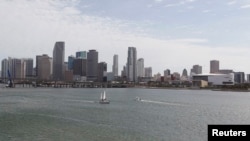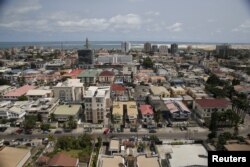The world’s poorest people are going to be hit the worst by catastrophic flooding as the climate warms, says an author of a report released Monday.
“It’s not just that a billion people will be exposed, but it will be the poorest people who will be most at risk,” Alison Doig, with Christian Aid, told VOA Monday following the London group’s release of the report.
The study predicts more than a billion people will live in low-lying cities exposed to massive flooding from rising sea levels by 2060 as a result of climate change.
Most of the cities are in Asia, but Miami, in the United States, is also at risk.
Doig cautioned against downplaying the risk to people in wealthy nations, but said they are more likely to recover than people in poor countries.
“They are extremely exposed, but they have resources to move house, to raise their homes, to put defenses around themselves. They have insurance that will pay back,” Doig said. “If you’re a poor person in Kolkata or Dhaka, you have no insurance. They have very, very little and when the devastation comes, if they do survive it, they have nothing left.”
The report focused specifically on the world’s cities and named Asian megalopolises like Kolkata in India and Dhaka, in Bangladesh, as being most at risk, along with some of the coastal cities of China, Indonesia, and the Philippines.
It said West Africa was also of concern, especially Lagos, Nigeria’s main city, and Ivory Coast's commercial capital, Abidjan.
In cities, people are more dependent on food, water, and fuel that is brought in from outside than in the countryside, where it is more likely for people to be self-sufficient. That makes urban residents more vulnerable to shortages, humanitarian crises and rising costs that can lead to riots and unrest.
Security experts have for years drawn a link between the effects of climate change and political instability.
“Of the most immediate concern, sharply reduced crop yields in multiple places simultaneously could trigger a shock in food prices with devastating effect, especially in already-fragile regions such as Africa, the Middle East and South Asia,” CIA Director John Brennan said in Washington last year.
Past research, unclear links
Their research has often looked at the effects of droughts and other natural calamities on migration and competition for resources that can set off conflicts, and some have pointed to drought as one trigger of the ongoing conflict in Syria.
The link between climate change and wars, however, is not as clear as some might suggest, said Ilan Kelman, a researcher at University College London’s Institute for Risk and Disaster Reduction.
“What we know from extensive research is that we have no specific conclusions in terms of climate change as a cause,” he told VOA. "It seems clear that climate change does not and will not cause war or peace."
Kelman said natural disasters caused by climate change can precipitate the start of conflicts such as the one in Syria, where people suffered political oppression under the Assad family for decades before war broke out.
“When you have that underlying cause, certainly if there’s a sudden change, such as rainfall in Syria, such as increased drought, such as sudden migration from rural to urban areas, that may be a trigger," he said. "That may be an impetus, that may spur on what people want to do anyway, but there were still those underlying decades of having brutal dictatorships, of being oppressed and not being able to pursue livelihoods."
Doig, who co-authored the Christian Aid report, agrees that flooding and other climate-related catastrophes serve as a trigger, if not an underlying cause. “If you’ve got a crisis, if you’ve got political instability, it’s going to ramp it up. It’s going to turn up the volume on any of that.”

